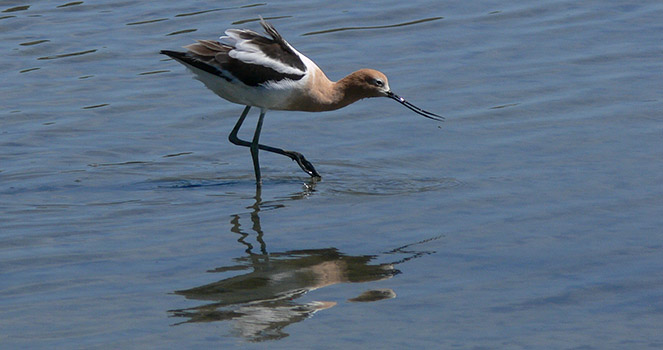What happens when we use consumer products like facial scrubs, toothpaste and medications? Some of them end up in San Francisco Bay. Wastewater that goes down your toilet, sink and shower drain is sent to a wastewater treatment plant that removes many toxic pollutants.

Birds, seals, fish and other life in San Francisco Bay can be harmed by plastic microbeads and pharmaceuticals, which have been detected in the Bay’s water. Photo by Joan Robins
By Sejal Choksi-Chugh
Published: June, 2015
What happens when we use consumer products like facial scrubs, toothpaste and medications? Some of them end up in San Francisco Bay. Wastewater that goes down your toilet, sink and shower drain is sent to a wastewater treatment plant that removes many toxic pollutants. But some contaminants are not removed and enter the Bay via treated wastewater, which harms water quality and wildlife. Here are ways you can help reduce contamination from two types of these pollutants, plastic microbeads and pharmaceuticals:
Avoid using consumer products that contain plastic microbeads.
Microbeads are tiny particles of plastic used in facial scrubs, shampoo, soap, toothpaste, eyeliner, lip gloss, deodorant and sunblock. When these products are washed down a sink or shower drain, microbeads aren’t removed by treatment at a wastewater plant—so they enter the Bay. There, microbeads absorb other toxic pollutants. Plastic microbeads are being found in the tissues of birds and marine mammals, and even open-water swimmers can swallow them. To avoid exposing wildlife and people to microbeads, don’t buy any product with an ingredient list that includes polyethylene (PE), polypropylene (PP), polyethylene terephthalate (PET), polymethyl methacrylate (PMMA) or nylon. Safe alternative ingredients that provide scrubbing include ground apricot shells and cocoa beans.
Avoid flushing unused or leftover medications down the toilet or sink drain.
Prescription drugs pass through sewage treatment plants and into waterways, where they harm fish and wildlife by preventing reproduction, interfering with foraging and reducing the ability to avoid predators. Eighteen common pharmaceuticals have been detected in the Bay. Drugs to treat hypertension, angina, arrhythmia and migraine—as well as antihistamines—have been found in the tissues of San Francisco Bay mussels. Use your county’s disposal program instead of flushing these drugs into the Bay (see sidebar on right).
Support laws in your community requiring drug manufacturers to implement safe and convenient programs for drug disposal.
Some Bay Area communities have drug disposal programs funded by taxpayers, and now counties are moving toward requiring drug manufacturers to be responsible for establishing and paying for these programs. Alameda County is implementing a safe prescription drug disposal program funded by pharmaceutical manufacturers, San Francisco is expanding a successful pilot program, and San Mateo County recently passed an ordinance requiring drug companies take over responsibility for safe disposal of their unused medications. Other Bay Area communities are considering similar options. Let your local leaders know you want safe drug disposal, funded by pharmaceutical companies.
----------------------------------------------------------------------------------------------------------------------------------------------------------------------
Where to Take Leftover Medications for Safe Disposal
Note: In most counties, not all dropoff sites accept controlled substances like prescription pain relievers.
• Alameda County
Dropoff sites include police stations, fire stations, senior centers, pharmacies and hazardous waste disposal facilities. www.acseniors-medisposal.net
• Contra Costa County
Dropoff sites include police stations, sheriff’s departments, hazardous waste facilities and other sites. cchealth.org/eh/medical-waste/faq.php or call (925) 692-2500.
• Marin County
Dropoff sites include pharmacies, police stations and recycling facilities. Search for “medical waste” at www.marincounty.org or call (415) 473-6907.
• San Francisco
Dropoff sites include pharmacies and police stations. Visit www.sfwater.org/index.aspx?page=479 or call (415) 355-3700.
• San Mateo County
Dropoff sites at police stations. Visit smchealth.org/rxdisposal or call (650) 372-6200.
• Solano County
Periodic prescription drug take-back days. To find dates and locations search for “take back” at www.solanocounty.com.
Sejal Choksi-Chugh is the Program Director and Interim Executive Director of San Francisco Baykeeper, www.baykeeper.org. Baykeeper uses on-the-water patrols of San Francisco Bay, science, advocacy and the courts to stop Bay pollution. To report pollution, call Baykeeper’s hotline at 1-800-KEEP-BAY, e-mail hotline@baykeeper.org, or click “Report Pollution” at www.baykeeper.org.

